The Military Service Appeal Tribunals handled appeals against compulsory military service after conscription was introduced on 2 March 1916.
Conscription updated the Derby Scheme, a voluntary recruiting system devised by Lord Derby, whereby men who ‘attested’, that is to say voluntarily registered to serve in the military, would only be called upon for service when necessary. That scheme was unsuccessful and soon abandoned in December 1915.
John William McDiarmid's appeal
Herbert Lionel Rosa Wilson's appeal
Military Service Act 1916
The new Military Service Act 1916 required all adult males, aged 18-41, to register for military service unless they were married, widowed with children, serving in the Royal Navy, a minister of religion or working in a reserved occupation. As the First World War progressed, the Armed Forces needed an endless supply of men. A second Military Service Act extended military service to include married men from May 1916 onwards, and a third Act extended the age range to cover males aged between 17 and 55 years old.
From 1916, volunteers and conscripted men seeking exemption from military service could appeal to Tribunals. The exemptions that were granted could be permanent, conditional or temporary and all were revocable.
A minority of the cases were appeals made by conscientious objectors. Many appellants were not unwilling to fight, and had previously joined up voluntarily but later lodged appeals on grounds of hardship or ill-health. The cases described here include examples where the tribunal decided it was in the interests of the local populace or to serve the war effort itself, that conscripted men remain in their civilian jobs.
Henry Drummond's appeal
An appeal by Henry Drummond, a plumber in Loanhead, illustrates the weighing up of national and local public interests.
On 30 May 1916 the Local Tribunal had granted Henry Drummond a conditional exemption from military service by reasoning that his current employment as a Sanitary Engineer was in the national interests. At the time he was installing a new water supply to Roslin Powder Mills, which was imperative for the continued production of munitions. By 9 March 1917 Henry had trained with the Loanhead Volunteer Corps and applied for withdrawal of his certificate of exemption so that he could make himself available for the Army. However, the Local Tribunal considered that his continued exemption from military service was in the interests of the 3,500 people living in the burgh.
In considering Henry’s appeal, the Town Clerk wrote:
“This man is the only Plumber in the Burgh…The Public Health Acts have to be carried out, and any arrangement of the Sewage system – a choke for instance – might endanger the health of the Burgh. The recent weather and the number of burst water pipes is an indication of the necessity of a local plumber.” (HH30/13/8/43, page 2)
The Tribunal decided that it was in the public interest for Henry to remain in his civil occupation, and dismissed the case for withdrawing his conditional exemption.
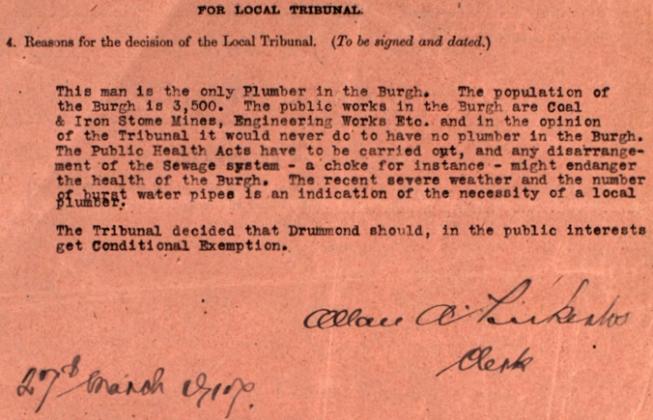
Detail from Henry Drummond's Appeal Papers
National Records of Scotland, Military Appeal Tribunal Papers, HH30/13/8/43, page 2
James Miller's appeal
On 2 July 1918 Mrs Agnes Miller submitted an appeal against military service on behalf of her son, James. James Miller had previously volunteered for military service but was told by the authorities to wait until he turned 18. Following his birthday on 19 May, his mother lodged an appeal.
Agnes put the case to the Tribunal that she needed her son to remain in his job as a Clerk in the Sanitary Office in Leith in order to support her financially:
"My husband died on 23rd January 1915, as the result of fatal injuries received in an accident leaving me with six children, viz:- 4 Sons and 2 Daughters. Robert, my eldest son, joined the Army in August 1914, on the outbreak of War, and is now in France…George, my second son, joined in May 1915 and was Killed in Action in Ypres on 9th October 1917. Alick, my third son joined about 18 months ago, and is now in Mesopotamia. James, my youngest and last surviving son, the lad now appealed for, reaches his 19th birthday on 19th inst., and has just completed his apprenticeship as Clerk in the Sanitary Inspector’s Office. His salary has been barely sufficient to maintain himself and I have been looking forward to a time when he would be of help to me. I earnestly ask the Army, that he be left in his civilian employment. I also appeal on the ground that serious hardship would ensue if this man were called up for Army service. My eldest son being now married in the Army is unable to contribute anything towards my support and I submit that it would be very hard if my youngest son were called up just when he has completed his apprenticeship and is now in a position to help me financially." (HH30/29/6/21, pages 3-4)

Detail from James Miller's Appeal Papers.
National Records of Scotland, Military Service Appeal Tribunal Papers, HH30/29/6/21, page 3
This application was dismissed, but James probably hadn’t completed training and been sent on active service by the time the war ended. He remained a sanitary inspector, married Jean Meikle Fordyce in 1936 and died in 1947, aged 47. His brother, George Miller, who died in 1917 serving with the Royal Army Medical Corps, was buried at Bard Cottage Cemetery, Belgium.
John William McDiarmid's appeal
Another resident of Leith, and attested volunteer appealing to the Tribunal on grounds of hardship, was 35 year old John William McDiarmid. According to his appeal papers, he had previously been rejected for medical reasons when volunteering but had been approved for service by 24 May 1918. John sought exemption on the grounds that he was the sole provider for his family; his brother Private George Alexander McDiarmid having been killed in the Quintinshill train crash on 22 May 1915, aged 30.
“Mother dead 12 years, I have been responsible for up Keep of house since then as Father is delicate and unable to work also have a sister who has to keep house I have three brothers serving in France and another killed in Gretna disaster have also brother who has Chronic Bronchitis I have been rejected myself till last examination medical when I was classed Grade II.”
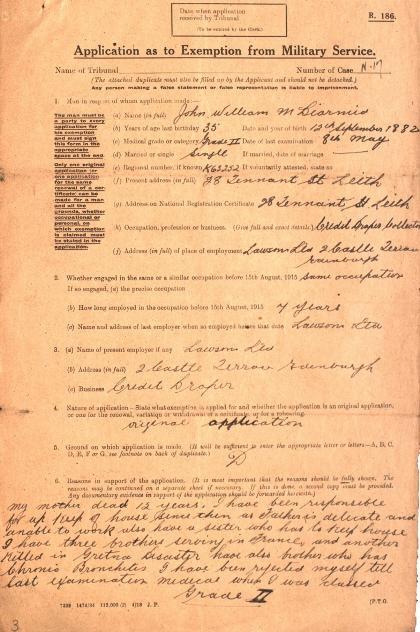
A page from John William McDiarmid's Appeal Papers
National Records of Scotland, Military Service Appeal Tribunal Papers, HH30/28/1/8, page 3
John’s appeal was dismissed, but as the Local Tribunal recommended he was not called up for service until 6 July 1918, he would still have been in training at the end of the war. He died in Queensferry in 1971, aged 89.
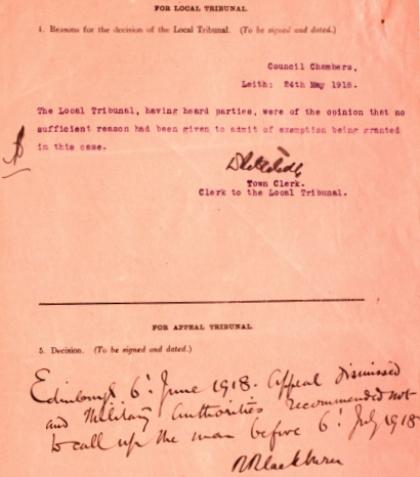
A page from John William McDiarmid's Appeal Papers
National Records of Scotland, Military Service Appeal Tribunal Papers, HH30/28/1/8, page 2
Robert Gordon Dunn's appeal
Robert Gordon Dunn was another attested volunteer wishing to join the armed forces. In 1917, his employer made the case against this; Robert was a clerk in the Imperial Russian Consulate in the Port of Leith and the Consulate considered him indispensable. The Consul himself, Peter Macdougal, was 75 years old and infirm. The appeal states that he was only able to attend the office between the hours of 10.00 and 12.30, and that Robert managed everything else outside that time. In addition, he argued that Robert’s work was important to the war effort:
“Mr Robert Dunn is the officially appointed Secretary of the Consulate having full authority to act with signature and seal. He has knowledge of the Russian language which is absolutely indispensable, and this combined with his extensive knowledge of Consular Laws and regulations daily needed, render it quite impossible to fill his place, which can be readily understood. Mr Dunn has, during the last two years, passed on repatriation for over 1,000 Russian subjects to Russia, besides large numbers of Army Reservists coming from the U.S.A. and Canada for Service…I deeply regret that Mr Dunn simply cannot be spared, being indispensable to the Business of our Ally, RUSSIA, and I claim him officially for such service.”
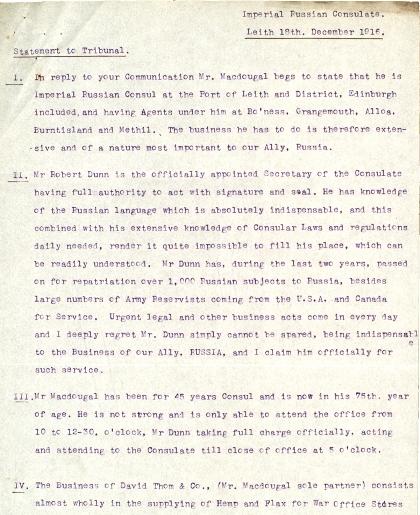
A page from Robert Gordon Dunn's Appeal Papers
National Records of Scotland, Military Service Appeal Tribunal Papers, HH30/14/4/12, page 10
Although Robert’s appeal was dismissed in January 1917, by 26 April 1917 the Local Tribunal agreed to recommend him for military service, but specified that he not be called up until 26 May 1917. He survived the war and died in Edinburgh in 1970, aged 77.
Herbert Lionel Rosa Wilson's appeal
Some applications for exemption from military service were made for medical reasons. One unusual example was submitted by an Edinburgh stationer and bookseller, Herbert Lionel Rosa Wilson, on 23 April 1918.
“The applicant is unfit for service and the Medical Board who examined him neglected to discover that fact…An X ray photograph of his heart and stomach shows that these organs are in fact so much displaced that he is physically unfit for service.”
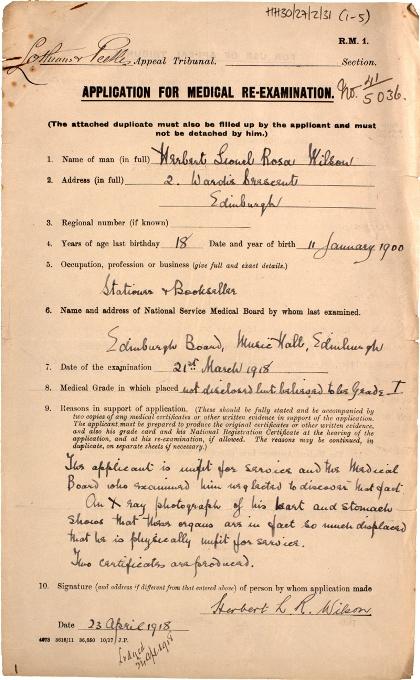
A page from Herbert Wilson's Appeal Papers
National Records of Scotland, Military Service Appeal Tribunal Papers, HH30/27/2/30, page1
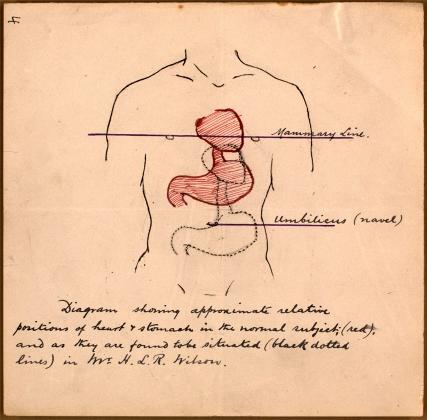
Medical diagram from Herbert Wilson's Appeal Papers
National Records of Scotland, Military Service Appeal Tribunal Papers, HH30/27/2/30, page 4
Dr W. Russell explained that “his heart is outside the mammary line and its action rapid, and he still looks to me as unfit for any kind of sustained physical effort. He has moreover a dropped stomach the lesser curve being below the umbilicus…it is a condition which asserts presence as years pass and always requires care in dieting.”
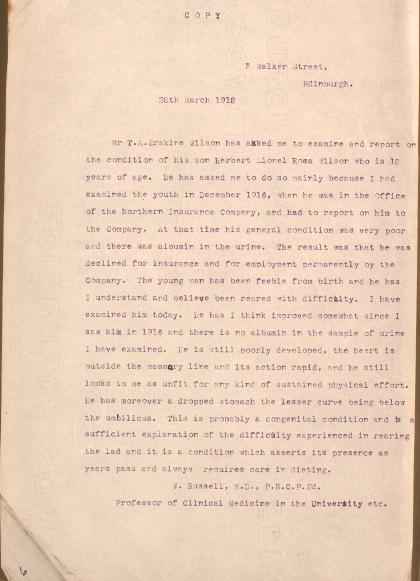
A page from Herbert Wilson's Appeal Papers.
National Records of Scotland, Military Service Appeal Tribunal Papers, HH30/27/2/30, page 6
In April 1918 the Army was becoming desperate for soldiers, and Herbert’s medical re-examination was refused. Herbert survived the war, and died in Edinburgh in 1989, aged 89.
James Drummond's appeal
The Army's urgent need for manpower is also evident in other Tribunal Papers, such as that of James Drummond, an ex-service man, formerly discharged from the Army on medical grounds. By 1918 he was a spirit merchant and had been called up once again, leading him to appeal.
“This Applicant was discharged from the Army on 1 January 1918 after serving over ten years at home and abroad. He was one of the Indian Expeditionary Forces in France. The Applicant served in France for a period of three years. He was wounded and gassed and it was on account of this and ill health that he was discharged from the Army as medically unfit.”

A page from James Drummond's Appeal Papers
National Records of Scotland, Military Service Appeal Tribunal Papers, HH30/28/3/26, page 5
The Tribunal did not see this as a good enough reason for granting an exemption and decided that “It is expedient in the National Interest that this man serve in the Army rather than remain in his present occupation, seeing that he is single, aged 28 & Grade I and that no excessive personal hardship would ensue from his joining the Colours.”
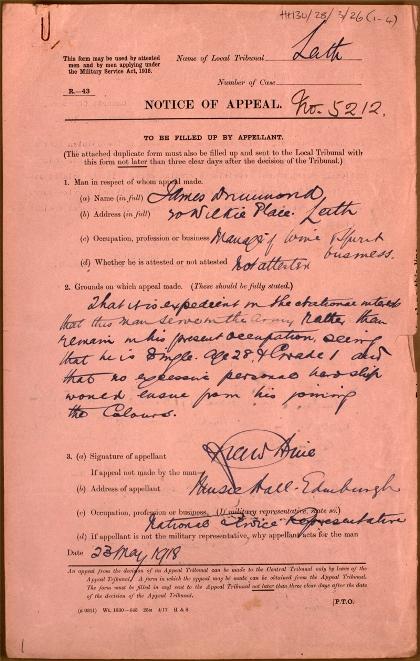
A page from James Drummond's Appeal Papers
National Records of Scotland, Military Service Appeal Tribunal Papers, HH30/28/3/26, page 1
The case proceeded to the National Service Medical Board for re-examination. However, James continued to work as a spirit merchant and died in Edinburgh in 1961, aged 65.
Robert Logan, a 21 year old coalminer from Tranent, was a conscientious objector. Applications on the ground of Conscientious Objection had to be supported with proof of ‘genuine conscientious conviction’ as set out in an official form:
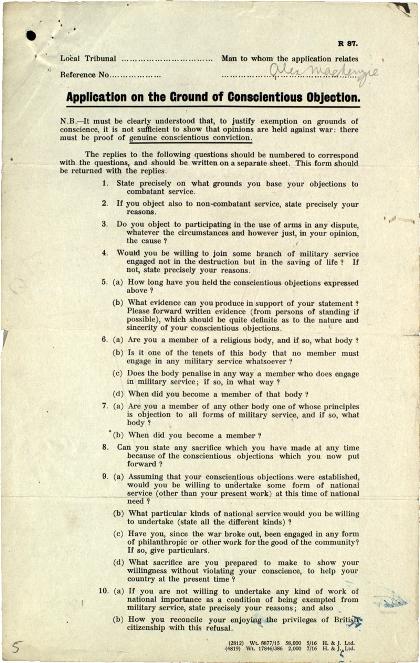
Official terms of conscientious objection, Robert Logan's Appeal Papers
National Records of Scotland, Military Service Appeal Tribunal Papers, HH30/28/1/20, page 5
In support of his appeal, Robert wrote:
“In claiming exemption from Military Service I do so because as an International Socialist I believe it is immoral for man to take from his fellow man that which he cannot replace or return & this presently applies to all human life I regard all such life as sacred & war immoral in the extreme. I believe in International Brotherhood not as an idle dream but as a social ideal possible of achievement. The workers of the world are bound by all the ties that bind kindred & more. They have the same aspirations & the same ideals & co-operate together with one another to add to the worlds store of happiness. No matter how perfidious Governments or our iniquitous press may disguise these facts & no matter how successful they may be in temporarily for their own material motives (Witness the “Secret Treaties” published by the Russian Bolshevik Government) in persuading certain groups of workers to hate one another & to act viciously towards one another I will not be a party to their crime against humanity.”
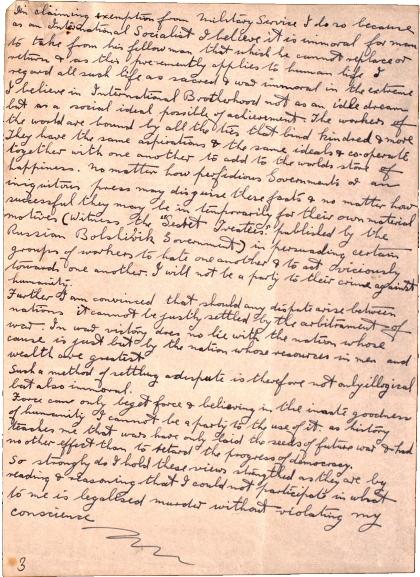
A page from Robert Logan's Appeal Papers
National Records of Scotland, Military Service Appeal Tribunal Papers, HH30/28/1/20, page 3
This passionate expression of his ethics was effective. The Tribunal were unanimous that his convictions were sincere and he was granted exemption from combatant service on 11 May 1918. He died in Tranent in 1943, aged 49.
Malcolm Martin's appeal
Thirty-six year old Malcolm Martin was originally from Stornoway, but by 1916 he was working as a shepherd in Punta Arenas, South America. A temporary holiday back on the Isle of Lewis led to his being caught up in wartime conscription. Malcolm submitted his appeal on 25 February 1916.
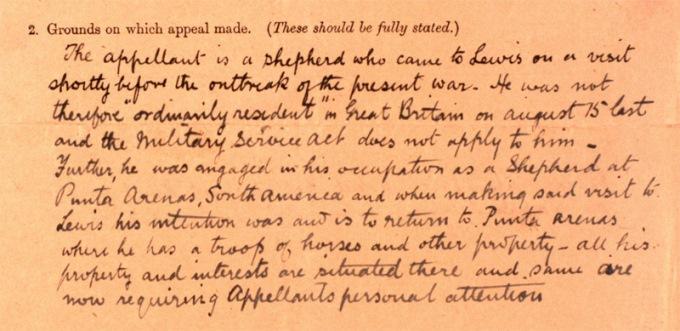
A page from Malcolm Martin's Appeal Papers
National Records of Scotland, Military Service Appeal Tribunal Papers, SC33/62/1/34, page 2
“This appellant is a shepherd who came to Lewis on a visit shortly before the outbreak of the present war. He was not therefore ‘ordinarily resident’ in Great Britain on August 15 last and the Military Service Act does not apply to him. Further, he was engaged in his occupation as a Shepherd at Punta Arenas, South America and when making said visit to Lewis his intention was and is to return to Punta Arenas where he has a troop of horses and other property – all his property and interests are situated there and Some are now requiring Appellants personal attention.”
As Malcolm was not ordinarily resident and his business remained in Argentina, he applied for absolute exemption on grounds of serious hardship. His appeal was refused on 31 March 1916 “in respect that applicant doesn’t come within the exceptions specified in the first schedule to the Military Service Act 1916.”
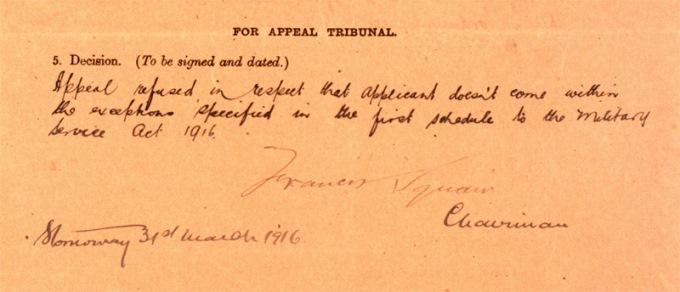
A page from Malcolm Martin's Appeal Papers
National Records of Scotland, Military Service Appeal Tribunal Papers, SC33/62/1/34, page 4
Martin’s appeal was unsuccessful, and he served in the Royal Naval Reserve. On 1 January 1919 he drowned with many other returning soldiers when HMY ‘Iolaire’ sank in The Minch, close to its destination, Stornoway, off the north-western coast of Scotland. Read about the 'Iolaire' disaster.
For further information about these records, please see our guide.


